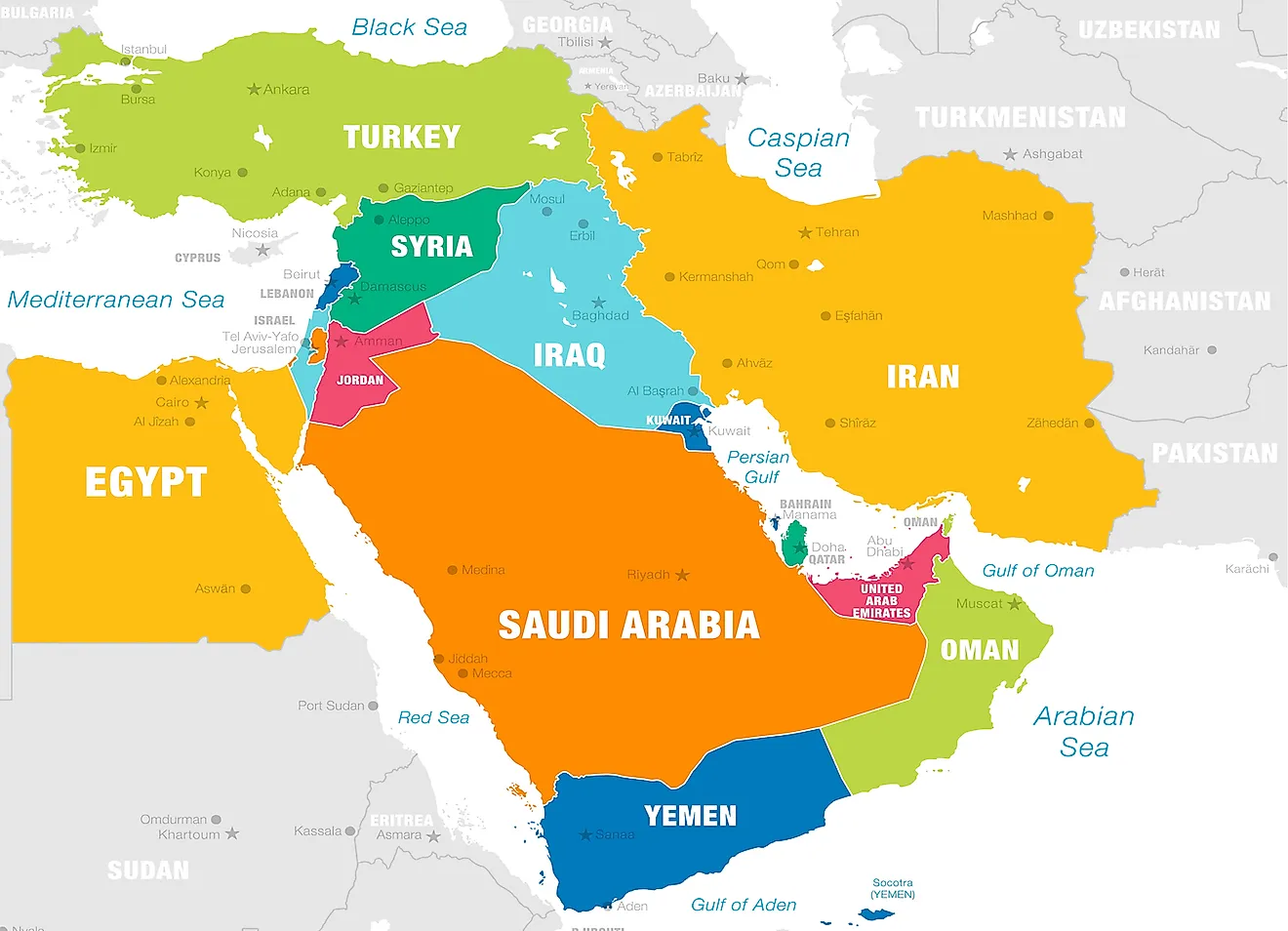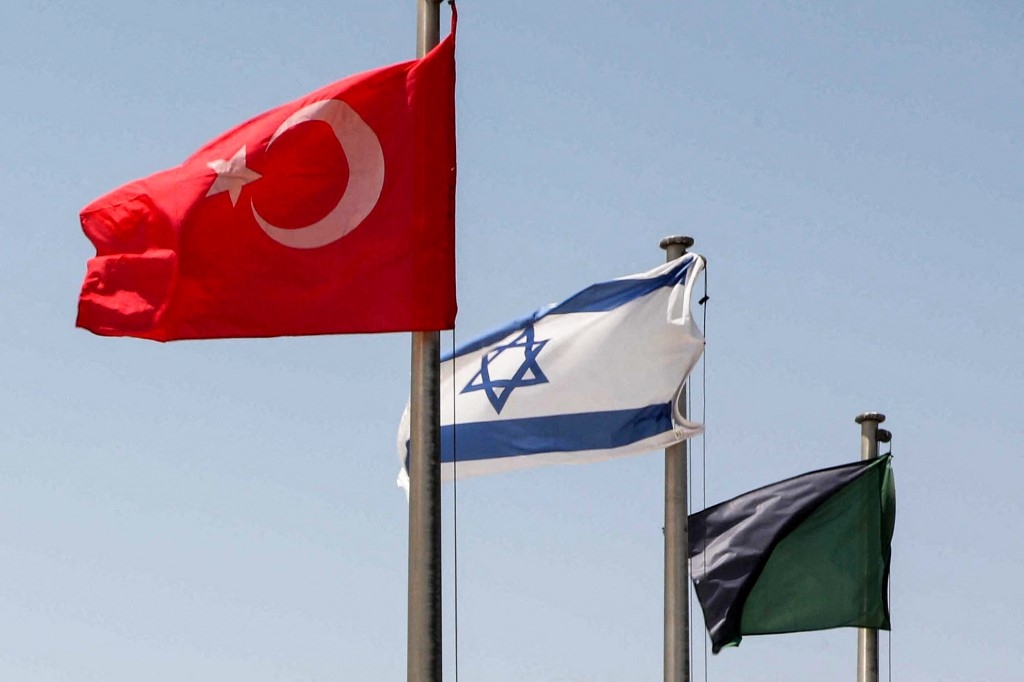
Religion vs Government
The relationship between religion and government in the Middle East


A generally accepted map of the boundaries of the Middle East. Note that the Mahgreb, Caucasus and Afghanistan are not included.
In the tapestry of global affairs, few regions possess the historical depth, cultural richness, and geopolitical significance of the Middle East. Central to its fabric is the intricate interplay between religion and governance, a dynamic that has shaped the region's past, defines its present, and will undoubtedly influence its future. Yet, despite its importance, the relationship between religion and government in the Middle East often falls prey to oversimplification and misunderstanding, perpetuating stereotypes and hindering genuine comprehension.

The three case studies my dissertation consists of: Turkey, Saudi Arabia and Israel
In this comprehensive exploration, we embark on a nuanced journey through the complexities of the Middle East, traversing its diverse landscapes and delving into the multifaceted interactions between religion and governance. Through meticulous analysis and thoughtful reflection, we aim to challenge preconceptions, foster understanding, and illuminate the intricate tapestry of this pivotal region.
Turkey
Nestled at the crossroads of continents and cultures, Turkey embodies the struggle for identity in the Middle East. From the ashes of the Ottoman Empire emerged the modern Turkish Republic, guided by the visionary leadership of Mustafa Kemal Ataturk. Ataturk's bold reforms sought to secularize and modernize Turkey, drawing inspiration from Europe and asserting the primacy of state over religion.
Founder of the Republic of Turkey, Mustafa Kemal Ataturk
However, Turkey's journey towards secularism has been far from linear. The pendulum has swung between secular liberalism and religious conservatism, each leaving its indelible mark on the nation's trajectory. The rise of Recep Tayyip Erdogan and his Justice and Development Party (AKP) heralded a resurgence of religious influence in Turkish politics, challenging the legacy of Ataturk and reigniting debates over the role of religion in public life.
Through the lens of Turkey, we confront the complexities of identity, the tension between tradition and modernity, and the enduring struggle to reconcile competing visions of governance.
Saudi Arabia
In the heart of the Arabian Peninsula lies Saudi Arabia, a nation steeped in tradition yet grappling with the forces of modernity. Forged in the crucible of desert sands and Bedouin culture, Saudi Arabia emerged as a unified kingdom under the leadership of Ibn Saud and the ideological influence of Wahhabism.
The Seven Mosques Complex, Medina, Saudi Arabia
Wahhabism, a puritanical interpretation of Islam, has long shaped Saudi society and governance, fostering a conservative ethos and reinforcing traditional norms. Yet, beneath the veneer of religious orthodoxy lies a society in flux, navigating the challenges of globalization, economic diversification, and social change.
The rise of Crown Prince Mohammed bin Salman has ushered in an era of ambitious reforms, signaling a willingness to embrace elements of modernity while grappling with the complexities of Saudi identity. From the empowerment of women to economic diversification initiatives, Saudi Arabia stands at a crossroads, balancing tradition with the imperatives of a rapidly changing world.
Israel
In the heart of the Levant, amidst the echoes of ancient history and the scars of modern conflict, lies the State of Israel. Founded in the aftermath of the Holocaust, Israel represents a sanctuary for the Jewish people, a homeland reclaimed from the ashes of persecution and diaspora.
The changing borders of claimed territory by Israel and Palestine
Yet, the establishment of Israel was not without controversy. The competing claims of Palestinians and Jews, rooted in centuries of shared history and divergent narratives, have fueled decades of conflict and division. The question of religion's role in governance looms large, as Israel grapples with the tension between its Jewish identity and its democratic principles.
From the secular ideals of its founders to the religious conservatism of its contemporary politics, Israel's journey reflects the broader complexities of the Middle East. The ongoing conflict with the Palestinians underscores the enduring influence of religion on geopolitics and the formidable challenges of achieving peace and reconciliation.
As we conclude our journey through the Middle East, we are reminded of the dangers of oversimplification and stereotype. Religion and governance in this region defy easy categorization, resisting simplistic narratives and binary interpretations. Instead, they reflect the intricate interplay of history, culture, and ideology, shaping the destinies of nations and peoples.
By embracing nuance and complexity, we move beyond the confines of ignorance and prejudice, opening the door to genuine understanding and dialogue. The Middle East, with all its contradictions and complexities, invites us to engage with humility and empathy, to seek truth amidst the cacophony of competing voices.
In our quest for understanding, let us transcend the limitations of orientalist caricature and embrace the richness of the Middle Eastern tapestry. For only through nuanced analysis and thoughtful reflection can we hope to navigate the complexities of religion and governance in this pivotal region.
This exploration of religion and governance in the Middle East is inspired by the research and insights presented at the HiPPS Annual Undergraduate Research Conference. Special thanks to Palestinian-American activist Edward W. Said for his seminal work on orientalism, which informs our understanding of the region's complexities.
This storymap is inspired by my undergraduate dissertation: The Relationship Between Religion and Government in the Middle East.